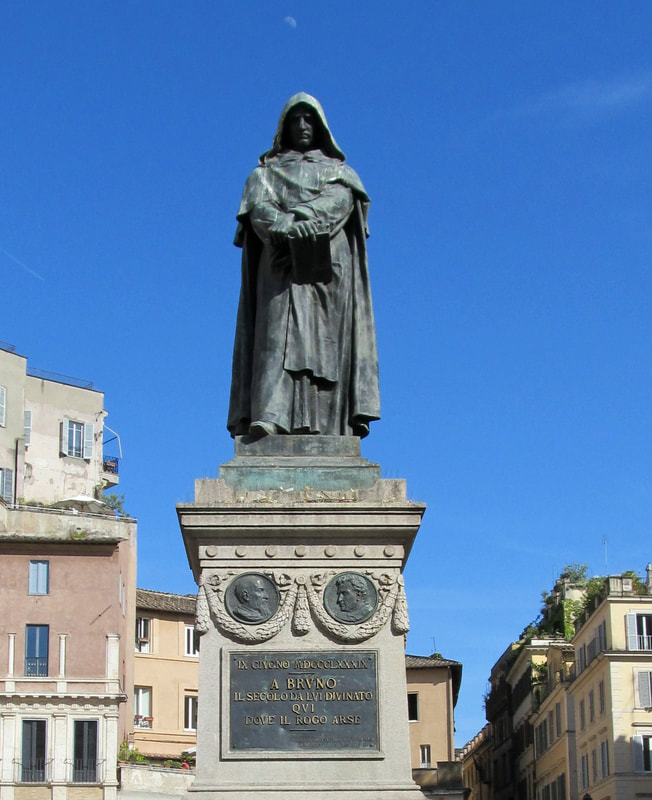Imagine someone so outspoken, so contrary to accepted knowledge that authorities had to gag him during his execution so he wouldn’t have the last word. His name was Giordano Bruno, burned at the stake on February 17, 1600.
Before Galileo, there was outlier Giordano Bruno, from Nola in the Campania region, who paid dearly for his offending mouth, a penalty which, no doubt, dampened Galileo’s own troublemaking a generation later.

points toward the Vatican.
This radical and unconventional thinker was born Filippo Bruno in 1548 in the town of Nola near Naples. Although a renowned Italian philosopher, astronomer, and mathematician, he was reckless and extremely argumentative – the perfect troublemaker. Ordained as a priest of the Dominican Order in 1572, taking the first name Giordano, his theories challenged the religious and scientific orthodoxy of his time. He openly embraced the outlawed Arian belief, which denied the divinity of Christ, leading to charges of heresy.
To escape his fate, Bruno fled first to Rome later spending fifteen years in Switzerland, France, England and a number of the German states teaching at universities – evidentially he was fluent in Latin, Italian, French, English, and German. Wherever he went, his revolutionary views and refusal to adhere to accepted dogma earned him the disfavor and condemnation of the Catholic Counter Reformation, and he was even excommunicated by the Protestants. (Luther had broken with the Church in 1521 leading to a century of Reformation and Counter Reformation)
Contrary to the teachings of Christianity, Bruno’s writings exposed divine providence as nonsense. According to Bruno, there was no all-powerful God controlling everything and administering rewards and punishments. Instead, the order in the universe stemmed from Nature itself, which is regenerative and built into all things.
What Bruno was actually trumpeting was the Greco-Roman philosophy of Titus Lucretius Carus (On the Nature of Things) written 50 years before Christ. That view was of a universe in which all things, seen and unseen, are composed of atoms. These atoms are the building blocks of everything that exists and are ever-changing due to chaos (the ‘swerve’) in Nature. Bruno also defended, before Galileo, the Copernican idea that the earth is not the center of the universe but merely a planet that revolves around the Sun. The Church and the academic establishment considered these ideas full-scale heresy.
This was dangerous ‘misinformation,’ as we would call it today, made worse by Bruno’s assertion that the Bible was a better guide to morality than to reality. (Even today, we can ask why there is no Godly mention in the Bible of new continents across the Atlantic Ocean, or that the Earth revolves around the Sun.) His heretical teachings ultimately led to his arrest by the Catholic Inquisition in 1593. After an eight-year period of trial, interrogation and imprisonment, Bruno refused to recant and was condemned to death by Pope Clement VIII. He faced his cruel execution with courageous defiance. His tongue was pierced with an iron spike or crucifix to silence him, and he was burned at the stake in Rome’s Campo dei Fiori, aged 52.
My own reflection on the life of Giordano Bruno concerns how an Italian, born centuries ahead of his time, courageously reasserted our Classical legacy from the Greco-Roman World. That world was nearly buried by the mysticism and intolerance of Middle Eastern religions. Were it not for Italian and other European monks who preserved and copied the works of Lucretius (cited above) and scores of Greek and Roman thinkers, men such as Bruno and even Copernicus (a Pole who studied in Italy) would have had little grounding.
Bruno’s attacks on the Bible contributed to changing European society from a closed-minded theocracy to an ever-questioning secular one. Clearly, there was no Giordano Bruno in Muslim culture. The much-touted age of Arab enlightenment (800 – 1200 AD) which itself was ignited by the discovery of earlier Greek scholarship, never survived the imams, ayatollahs, and fatwas. Nor did medieval Jewish science challenge Biblical ignorance as it was more absorbed with its lunar calendar and predicting the coming of the Messiah. The Laws of Nature were left to men like Galileo and Giordano Bruno.
To borrow a phrase, Italy was a “light unto the nations.” -JLM




its a timely reminder too, of the genius of our founding fathers (yes with all their faults) to keep personal religious beliefs separate from a state sponsored religion.
Anyone interested in reading more about this fascinating world figure can access the XLLII (2016) issue of Italic Way for the article, “Troublemakers.”
Link is below.
https://italic.org/wp-content/ResearchLibrary/ItalicWay/Editions/XLII_WEB.pdf#search=%22giordano%20bruno%22
A very inspiring narrative suggesting a secular, male Joan of Arc. Apart from constructing the aforementioned lunar calendar, I would argue whether there was ever a Jewish “science” at all. What transpired was centuries of dissecting the Talmud and the Rabbis’ spin on it, and most of the noted “personalities” or false messiahs were only extensions of prevailing Jewish dogma which included 613 halacha (laws) or the ethics of hiring a shabbos goy to kindle the flames Friday night. From my observations it was only the Reform synagogue movement in the 20th Century that considered the exigencies of modern life.
Jewish science didn’t actually begin until the 19th Century when they embraced Western secular education. E=MC2 (Einstein) was their first real understanding of Natural Laws. And it took the Italian Enrico Fermi to prove it out.
Giordano Bruno and Enrico Fermi both speculated about life on other planets. Bruno believed numerous planets exist (possibly infinite in number) where life existed. Fermi believed the opposite, which is that if extraterrestrial life existed it would surely have been detected by now ( “Fermi’s Paradox”). With all of the recent credible sightings of unexplained aerial phenomena, Bruno was probably right.